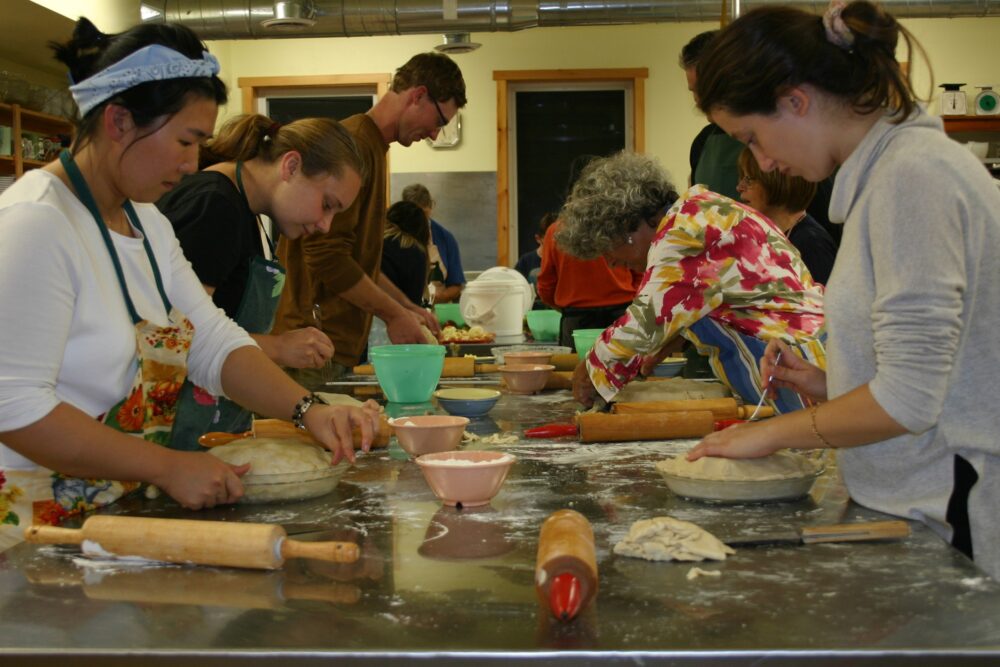
Opening every nook and cranny of our lives to the Gospel.
In Catherine’s Doherty’s book The People of the Towel and Water, she spells out the gospel spirit as it applies to the many aspects of daily life: sorting clothes, office work and filing, beekeeping and bookkeeping, cooking, cleaning, farming, handicrafts, nursing, music, letter writing, conversation, etc. It is quite an impressive list.
Buried Treasure
This connectedness between spiritual vision and everyday application is characteristic of her approach to life. Behind it all is a pressing ambition: “The urge of my heart is to restore man to total wholeness as my parents restored me.
“My passionate desire is to develop each person to the fullness of his or her capacity or talents. If need be, we must dig for those talents. They may be latent. We must offer every possibility and opportunity, overcome every difficulty, to develop them.
“It is worth everything to enlarge natural horizons so as to allow the supernatural ones to have room to grow and expand. In other words, to give Christ room, not only to grow to his full stature, but to have a place within us to roam as he may wish, a place for him to breathe and stretch.”
As a result, all of us at Madonna House have found ourselves, at one time or another, plunged into unfamiliar — not to mention uncomfortable — waters.
Those who loathe the retail world discover themselves appraising and selling jewellery to raise money for the poor. Kitchen “klutzes” end up cooking for hundreds. Flabby muscles are put to use splitting wood or heaving bales of hay. Outdoor types come inside to file cards or sort books.
Come evening, brains drained from such exertion are invited to consider aspects of scripture, theology, and other matters relevant to our faith.
All this so that Christ might have “room to roam” in us. So that we may have about us an integrity (and a humility!) that we would never discover if left to our own rather straitlaced vision of things.
Catherine recognized that wholeness and holiness come from the same root, and so she has taken pains to graft us onto the great and fecund Vine who is Christ in the everyday. He is first of all in those with whom we live or work. He deserves to be loved there very, very well.
This challenges us to serve with a creative, joyous spirit. Everywhere, we seek to bring about God’s order so that his beauty might radiate from shining pans and holy icons, from smooth-running engines and hard-breathing horses, from fine-woven rugs and fresh-folded sheets.
But our first love and our finest energy is reserved for the poor. We long to console the Poor Man in each other and to love him in all whom the Father sends our way.
We say, “Come and enter my heart awhile. You may find there a quiet space to rest. Perhaps the traces left by God’s redeeming love will awaken hope in your own heart!
“Let’s have a cup of tea together and afterwards wash up the dishes, or paint that drab-looking wall, or scrub this dirty floor, or pile the wood indoors before the snow flies.
“Christ awaits us in all those places, and he will feed us his Body and Blood to help us go still further. Let us rise up eagerly to meet him!”
This sort of training, be it in Combermere, Poughkeepsie, or Paris, is directed towards a single goal: to live as fully as possible a Christ-centered life. If it is lived well, then Christ himself lives among us, and it is he who then can heal and teach and shepherd and console.
What Christ requires of his Church today is room to roam. Sadly, we too often deny him this space. We deny it to him because we refuse to make prayer the priority of our lives. Not the prayer of hours spent in pious exercises, but that of a heart that cries continually to God for light, mercy, forgiveness, strength.
Most of our churches are locked today. They symbolize the state of our souls. The doors are barred not so much because of rising vandalism but rather because of adiminished spirit of prayer among us who should be praying for the conversion of thieves. We are busy about other things.
We deny Christ room to love us wholly because we ignore his commandment to love one another with his kind of dedication. How often do we regard those around us as obstacles to our really accomplishing something for God?
Litmus Test
Rather, it is they who, from God’s point of view, are our real “project,” the litmus test of whether the Gospel lives or dies in our hearts.
We refuse Christ space to love us because we are leaving so many corners of our lives—our work, our homes, our parishes, our kitchens, bedrooms, boardrooms—outside the penetrating light of the Gospel. Yet every corner of life stands under judgement before his face, and it is we who know his name who will be held most accountable for our negligence.
Single Refrain
And so the Spirit continues to speak a single word through Catherine’s writings and through the way of life Madonna House tries to implement in response. That word, so relevant to these times and to this New Year, is Nazareth.
Nazareth means prayer as away of life. It means absolute commitment to those God calls us to love. It means opening every nook and cranny of our lives to the light and the delight of the Gospel.
If we live this way, then we will be restored wholly to him. Christ, alive among us, will make his Church glorious with his own glory.
Adapted from a Restoration article in January, 1986.
People of the Towel and Water is available from MH Publications: publications.madonnahouse.org/products/people-of-the-towel-and-water
[Photo by ©Christina Milan, MH]




